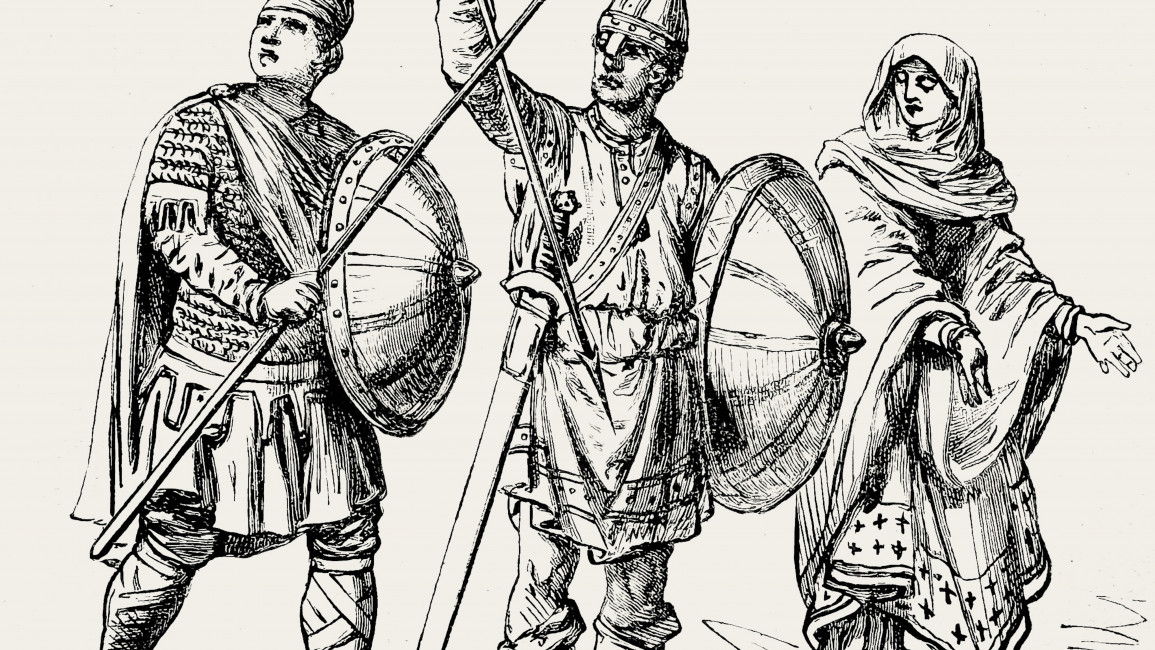Anglo-Saxon warriors might have fought in northern Syria during Byzantine golden age
Anglo-Saxon warriors could have fought Sassanid forces in northeast Syria, in a remarkable understanding of history of the MENA region.
The Anglo-Saxons were a Germanic-speaking people who invaded and settled in England — during and after the fall of the Roman Empire — greatly influencing language, culture, and governance on the British Isles.
Dr. St John Simpson, a senior curator at the British Museum, said there was compelling evidence that Anglo-Saxon princes also fought for the Byzantine Empire in the eastern Mediterranean against the Iranian Sassanids, due to items found at burial sites in Sutton Hoo, Taplow and Prittlewell in England.
"The pearl roundel on the Prittlewell flagon is unique and puts its iconography firmly within a Sasanian design language, suggesting that it was made farther east, in a Sasanian workshop," Simpson said, according to The Guardian.
"The eastern connections of the warrior tunics at Prittlewell and Taplow, coupled with the design of the shoulder clasps from Sutton Hoo, strengthen the idea that these individuals returned from Syria aligned even more closely with the late antique fashions of Byzantine-Sasanian elite warrior society."
The early Anglo-Saxon period of English history was typically viewed as a period of insularity, violence, and relative backwardness after centuries of Roman rule.
Simpson said that the number of items found at the burial sites, including armour of Eurasian design, flies in the face of the "simplistic" view that non-local goods found on the isles arrived via trade and could help us rethink life in Anglo-Saxon England.
"These finds put the Anglo-Saxon princes and their followers centre-stage in one of the last great wars of late antiquity. It takes them out of insular England into the plains of Syria and Iraq in a world of conflict and competition between the Byzantines and the Sasanians and gave those Anglo-Saxons literally a taste for something much more global than they probably could have imagined," Simpson said.
"It adds an international dimension to those sites. We have looked at the Anglo-Saxons in a rather insular manner."
The Byzantines, also known as the Eastern Roman Empire, ruled a vast territory in southeastern Europe and northwestern Asia until their defeat to Muslim Arab and later Ottoman and Turkic-speaking armies.
They frequently hired mercenaries from elsewhere in Europe to handle waves of attacks from Sassanid and other forces, with potentially rich rewards for foreign fighters.







 Follow the Middle East's top stories in English at The New Arab on Google News
Follow the Middle East's top stories in English at The New Arab on Google News
![The new film casts Israeli actors to tell the story of Mary while leaving out Palestinians [Getty]](/sites/default/files/styles/image_330x185/public/2024-11/GettyImages-2172155541.jpg?h=199d8c1f&itok=wJWyXDEQ)
![Ben & Jerry's has taken Unilever to court for its alleged attempts to silence it [Getty]](/sites/default/files/styles/image_330x185/public/2024-11/GettyImages-2183900214.jpg?h=199d8c1f&itok=jEcYtQ64)
